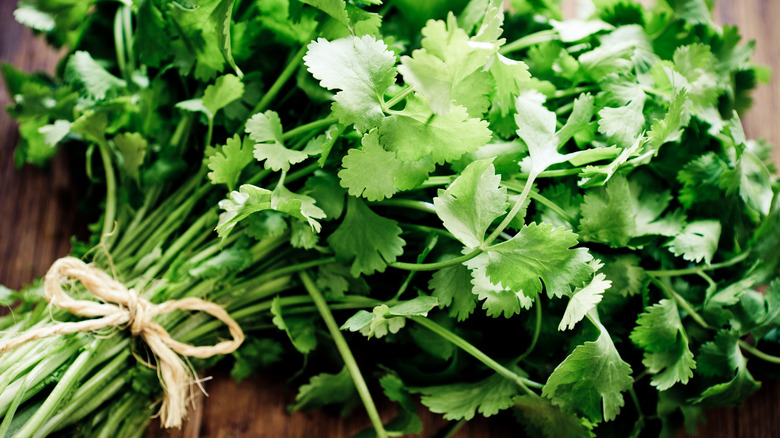Cilantro Is The One Ingredient Lidia Bastianich Refuses To Add To Her Food
There are always going to be ingredients that some people don't like to eat — and there may be no more perfect example of this than cilantro. This herb has divided eaters for years: There are those who love it and those who loathe it. You can count many culinary celebrities in the latter category, perhaps most famously the late, great Julia Child. But PBS cooking personality Lidia Bastianich also has a particular dislike for cilantro. She has stated on many occasions that she will never use cilantro in her cooking.
It's not as though Bastianich is a picky eater — quite the opposite, in fact. She has professed her love of food from all over the globe for decades. But when it comes to cilantro, she just can't do it. "I do not like cilantro," Bastianich told In Kansas City. "There is something about it that makes me feel like I have a mouth full of soap when I taste it. It must be in my genes."
The idea of your dislike of a food being genetic may sound like a bit of an exaggeration, but it's entirely possible that's the reason behind Bastianich's loathing for cilantro. There are people who simply don't like the herb as a matter of preference, but when someone says specifically that cilantro tastes like a mouthful of soap, then there is actually something deeper going on.
Your genetics help determine how cilantro tastes
If you've ever eaten cilantro and, like Lidia Bastianich, felt like you were taking on a mouthful of soap, you might be surprised to learn that you might actually be genetically averse to the herb. According to Britannica, the aldehydes found in cilantro leaves can taste like soap — but only to people who have a certain variation in their olfactory receptor genes, roughly 20% or less of the population. If Lidia Bastianich finds herself among them, it's no wonder why she has staunchly refused to add it to any of her food for the entirety of her television and cooking career. (It's a little hard to enjoy — and cook with — an ingredient that tastes like it belongs nowhere near your food, let alone balance other flavors with cilantro's herby freshness if you don't perceive it yourself.)
Cilantro is also not an ingredient that is frequently found in the Italian cooking that's a specialty of Bastianich's. Herbs like basil, oregano, parsley, bay leaf, rosemary, and thyme all are much more common staples in Italian cuisine. Sage is a particular Bastianich favorite, one that she uses to liven up fettuccine alfredo. So while you won't find cilantro in her kitchen, Lidia Bastianich certainly doesn't avoid using herbs — she's just not a fan of the soapy ones.

